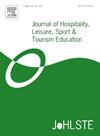Sport law in U.S. undergraduate sport management programs: What should we be teaching?
Abstract
Sport law knowledge is a vital component of sport management education and professional preparation for those working in the sport and recreation industries. It has been more than 15 years since scholars fully analyzed the content of sport law courses. Given the increase in litigation surrounding the sport industry, there is increased focus and interest in the law as a teaching tool within the sport management curriculum. Sport management curricula must continue to evolve and adapt to respond to the dynamic nature of industry and academia. Therefore, this study updates foundational work on the content of sport law classes in U.S. undergraduate sport management programs. Through an online survey of sport law course instructors in undergraduate sport management programs, we discovered all instructors include Title IX in their courses. Consistent with previous research, the next most covered areas included aspects of negligence law and contract law. Many instructors thought that criminal domestic violence/intimate partner violence was an important topic that they were not covering in their course. We did find differences in course content by instructor educational degree and legal practice history. This work can inform sport management program assessments and sport law course syllabi construction.

 求助内容:
求助内容: 应助结果提醒方式:
应助结果提醒方式:


